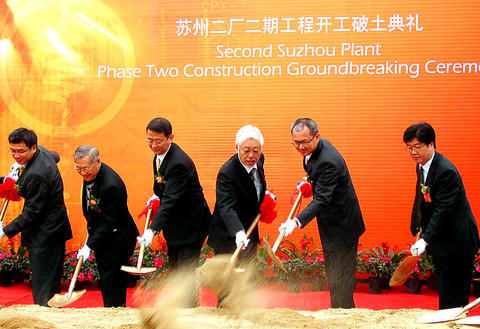Yageo Corp (國巨), the nation's largest passive components service provider, yesterday celebrated its 10th anniversary in China by opening its second plant in Suzhou, saying it aims to become an industry leader.
The Second Suzhou Plant will become the world's largest single passive component back-end production line, with monthly capacities of resistor chips (R-Chips) and multilayer chip capacitors (MLCC) reaching 36 billion and 11 billion pieces respectively by the end of next year, the company said in a statement.
"Yageo launched operations in China in 1996 and, in 10 years, we've established a complete production, sales and logistics network in southern, eastern and northern China, creating the world's largest passive component supply chain," chairman Pierre Chen (

PHOTO: CNA
In the Chinese market, Yageo has assumed the No. 1 position in R-Chips, with a 39 percent market share, and the second position in MLCC, with a 19 percent share, behind Japan's Murata electronics Co, the company said.
Yageo plans to boost its monthly capacity of R-Chips to between 44 billion and 45 billion pieces, and that of MLCC to between 22 billion and 23 billion pieces, by the end of next year, Chen said in an interview with the Central News Agency.
"Demand is strong and our target of NT$50 billion (US$1.54 billion) in revenue in three years has not changed," Chen said.
Yageo's sales for last year grew by 23 percent to NT$20.39 billion. For the first nine months of the year, the company's revenue increased by 11 percent from a year ago to NT$16.66 billion.
Yageo yesterday broke ground for the second phase of construction at the Second Suzhou Plant. The capacity expansion is necessary to keep pace with customer demand, in particular from the rapidly expanding Chinese market, it said.
More than 50 percent of Yageo's revenue comes from China, and the percentage is expected to increase to 75 percent in the next three to five years, Yageo CEO David Huang (
Driven by strong global demand, shipments of laptop computers, mobile phones and LCDs will increase by 22 percent, 10 percent and 3 percent respectively next year, said Ting Chung-yi (丁忠儀), Yageo's general manager of China Operations.
Growth in the Chinese market will outpace that in the global market as a result of surging domestic demand and business opportunities brought about by next year's Beijing Olympics, Ting said. Yageo predicts 40 percent and 20 percent increases in Chinese sales of notebook computers and mobile phones respectively, and 67 percent for LCD TVs next year, Ting said.
To consolidate its leading position, Yageo said it would build a third research and development center in Suzhou to complement those already in the Netherlands and Taiwan.
Meanwhile, to expand sales channels in China, Yageo's board yesterday approved a proposal for the company's subsidiary, Yageo Holding (Bermuda) Ltd, to invest approximately US$3.2 million in Ko-E Holding (
Shares of Yageo closed up 2.43 percent at NT$12.65 on the Taiwan Stock Exchange yesterday.

Quanta Computer Inc (廣達) chairman Barry Lam (林百里) is expected to share his views about the artificial intelligence (AI) industry’s prospects during his speech at the company’s 37th anniversary ceremony, as AI servers have become a new growth engine for the equipment manufacturing service provider. Lam’s speech is much anticipated, as Quanta has risen as one of the world’s major AI server suppliers. The company reported a 30 percent year-on-year growth in consolidated revenue to NT$1.41 trillion (US$43.35 billion) last year, thanks to fast-growing demand for servers, especially those with AI capabilities. The company told investors in November last year that

Taiwanese suppliers to Taiwan Semiconductor Manufacturing Co. (TSMC, 台積電) are expected to follow the contract chipmaker’s step to invest in the US, but their relocation may be seven to eight years away, Minister of Economic Affairs J.W. Kuo (郭智輝) said yesterday. When asked by opposition Chinese Nationalist Party (KMT) Legislator Niu Hsu-ting (牛煦庭) in the legislature about growing concerns that TSMC’s huge investments in the US will prompt its suppliers to follow suit, Kuo said based on the chipmaker’s current limited production volume, it is unlikely to lead its supply chain to go there for now. “Unless TSMC completes its planned six

Intel Corp has named Tasha Chuang (莊蓓瑜) to lead Intel Taiwan in a bid to reinforce relations between the company and its Taiwanese partners. The appointment of Chuang as general manager for Intel Taiwan takes effect on Thursday, the firm said in a statement yesterday. Chuang is to lead her team in Taiwan to pursue product development and sales growth in an effort to reinforce the company’s ties with its partners and clients, Intel said. Chuang was previously in charge of managing Intel’s ties with leading Taiwanese PC brand Asustek Computer Inc (華碩), which included helping Asustek strengthen its global businesses, the company

Power supply and electronic components maker Delta Electronics Inc (台達電) yesterday said second-quarter revenue is expected to surpass the first quarter, which rose 30 percent year-on-year to NT$118.92 billion (US$3.71 billion). Revenue this quarter is likely to grow, as US clients have front-loaded orders ahead of US President Donald Trump’s planned tariffs on Taiwanese goods, Delta chairman Ping Cheng (鄭平) said at an earnings conference in Taipei, referring to the 90-day pause in tariff implementation Trump announced on April 9. While situations in the third and fourth quarters remain unclear, “We will not halt our long-term deployments and do not plan to